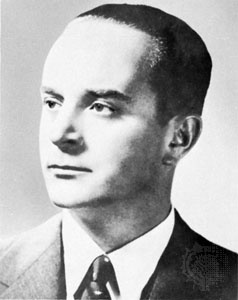Arbenz (Guzmán), Jacobo
president of Guatemala
born Sept. 14, 1913, Quetzaltenango, Guat.
died Jan. 27, 1971, Mexico City
 soldier, politician, and president of Guatemala (1951–54) whose nationalistic economic and social reforms alienated conservative landowners, conservative elements in the army, and the U.S. government and led to his overthrow.
soldier, politician, and president of Guatemala (1951–54) whose nationalistic economic and social reforms alienated conservative landowners, conservative elements in the army, and the U.S. government and led to his overthrow.The son of a Swiss pharmacist who had emigrated to Guatemala, Arbenz was educated at the National Military Academy of Guatemala. He joined a group of leftist army officers that overthrew the Guatemalan dictator Jorge Ubico in 1944, and in 1949 he was the minister of war in Juan José Arévalo's government. In March 1951 he succeeded to the presidency, supported by the army and the left-wing political parties, including the Guatemalan Communist Party.
Arbenz made agrarian reform the central project of his administration. This led to a clash with the largest landowner in the country, the U.S.-based United Fruit Company (Chiquita Brands International, Inc.), whose idle lands he tried to expropriate. He also insisted that the company and other large landowners pay more taxes. As the reforms advanced, the U.S. government, cued by Secretary of State John Foster Dulles, became increasingly alarmed, fearing the threat to sizable American banana investments and to U.S. bank loans to the Guatemalan government as well. Also of concern to the United States were the increasingly close relations between Guatemala and the communist bloc of nations. A public-relations campaign painted Arbenz as a friend of communists (whose support he undoubtedly had); and the U.S. Central Intelligence Agency, working in Honduras and El Salvador, helped to organize a counterrevolutionary army of exiles led by Col. Carlos Castillo Armas. Exaggerations of the size of the invading force panicked the capital; the Guatemalan army refused to fight for Arbenz, and he was forced to resign (June 27, 1954) and go into exile. He traveled to Mexico, Switzerland, and Paris and was offered asylum in the Soviet-bloc countries for a time. Meanwhile, in Guatemala, Castillo Armas, who soon became president, reversed most of the reforms of the previous decade and offered generous concessions to foreign investors. In 1957 Arbenz moved to Uruguay, then to Cuba, and in 1970 he returned to Mexico, where he was granted permanent asylum. One year later he drowned in his bathtub in Mexico City.
- Simon van der Meer
- Simon Vestdijk
- Simon Vouet
- Simon Wiesenthal
- Simon Willard
- simony
- simoom
- simple harmonic motion
- Simple sentences-first pattern
- Simple sentences-second pattern
- Simplicius Of Cilicia
- Simplicius, Saint
- Simplon Pass
- Simplon Tunnel
- Simpson, Christopher
- Simpson Desert
- Simpson, George Gaylord
- Simpson, Louis
- Simpson, Matthew
- Simpson, N.F.
- Simpson, O.J.
- Simpson, Sir James Young, 1st Baronet
- Simpson, Sir John Hope
- Simpsons, The
- Simrock, Karl Joseph